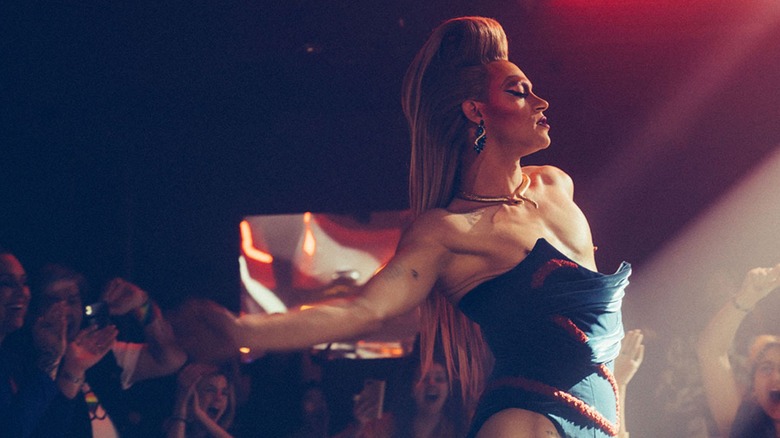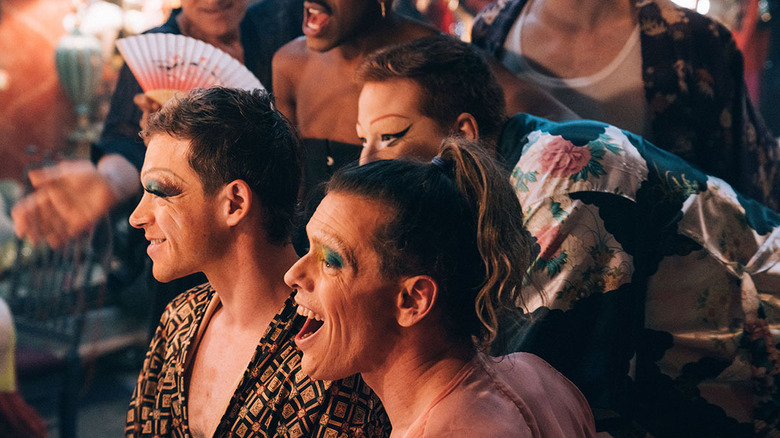Solo Review: A Dazzling Celebration Of Drag [TIFF 2023]
The art of drag provides the opportunity to find yourself. That may sound odd considering the objective is typically to make yourself look like somebody else, but that transformation has a magical way of discovering something within yourself you never ever knew was there. Few films understand the power of drag like Sophie Dupuis's "Solo," a radiant and intimate story of queer life and a celebration of the queer community's connection to the art of drag.
Simon (Théodore Pellerin, "On Becoming A God In Central Florida") owns Montréal nightlife. He's garnered a reputation as one of the premier drag queens of the city, impressing with a tantalizing combination of a tight lipsync, fierce dance moves, and gorgeous fashion-forward outfits, made specially for Simon by his sister. When Simon transforms into Glory Gore, she's unstoppable; in complete command of the stage and audience — people just can't get enough, cheering her name and soaking in every second of her fiery performances.
Outside of drag, Simon isn't doing too badly either. He's a gifted makeup artist by day, helping people look their best for important photoshoots — photographers regularly extol his gifts. He even has a hugely supportive family — his sister is his closest friend and designer, and his father and stepmother celebrate their child's art profusely, attending his shows and cheering him on vigorously.
But there's something missing in Simon's life — love. He's never struggled to find a lover, mind you — Simon parties after shows and dances with much of the confidence that informs his drag character. But he's struggled to find romance. That's about to change thanks to a new addition to the performers at the nightclub — Olivier (Félix Maritaud, "120 BPM"), who's recently arrived from France, performs as Dragona. Olivier and Simon hit it off instantly, and before long they do everything together, including their drag numbers.
"Solo" is a vibrant portrait of queer nightlife. Dupuis' script showcases queer people in a decadent, yet complicated life. When things are great, it feels euphoric — Glory's opening number, set to ABBA's "Voulez-Vous," and the queens backstage dancing and singing the night away to Chaka Khan's "I'm Every Woman" as a community, for example, are fabulous.
A vibrant exploration of queer life
Of course, a story is nothing without conflict, and Dupuis injects some through Simon's relationships with boyfriend Olivier and his biological mother Claire (Anne-Marie Cadieux), a famous opera singer who left Simon and his sister behind 15 years prior to travel the world as an artist. As a fellow artist, Simon defends his mother — he understands what a performer has to do to follow their dreams. Maud, who sees things very differently, wants nothing to do with her. But Claire is back in town after years away, which means Simon finally has the chance to see her again.
Then there's Olivier. What started as a dreamy romance, shot tenderly by Dupuis's warm, inviting lense, soon becomes toxic. Olivier starts to manipulate Simon, chipping away at his sense of self-worth and pulling him further from his support systems. Olivier is undoubtedly awful, but Dupuis's script refuses to treat Olivier as an out-and-out villain, instead understanding how the challenges of being queer can manifest in damaging ways. While it's never explained why Olivier left France, his need for a new life suggests he's had some intense struggles of his own.
"Solo" does such a fantastic job aligning us with Simon. I found myself deeply invested in his journey — because Dupuis does great work letting us fall in love with him. By showing Simon at the highest highs, in complete command of the stage, laughing the days away with his loving family, and dancing the night away with his friends, it feels especially tragic to see Simon slowly descend from the joy he once held so close.
While the plot of "Solo" is pretty predictable — his relationship with his mother and boyfriend both feel too familiar — it's still enthralling to watch. Dupuis brilliantly highlights the importance of drag in Simon's life. We see a variety of different drag numbers, which show us Simon's innermost journey. When he first performs with Dragona, it's electric. Their chemistry is off the charts, and the crowd reacts appropriately, bursting into feverish applause when the pair make out on stage. (How wonderful, in a year of such turmoil, that a scene of two drag queens kissing is met with nothing but exuberance). But as their relationship begins to break down, their performances become stiff and laden with tension — far more uncomfortable than sexual. Despite Simon appearing confident, these relationships remind Simon that he's got a long way to go to become the best version of himself.
Pellerin gives a masterful performance
"Solo" is a film that also celebrates femininity boldly and proudly. Outside of drag, Simon wears outwardly feminine clothing and is particularly keen on a lime green crop top that he often wears in the club after the drag shows. There's no mistaking Simon's sexuality, and it's a pointed choice that he goes out every day proud of who he is, embracing both the masculine and feminine elements of his persona. He never walks, he struts — "Why do you do drag if not to strut?" Simon asks.
Pellerin is the heart of this film, and his performance as Simon is phenomenal. He's completely committed and fearless. It never once feels like Simon's affectations are put on — instead, this feels like a person who's lived their whole life to stand out. His performance is nuanced in its portrayal of the two sides of Simon's life. Simon out of drag and his drag persona feel like they're two sides of the same coin — similar, but different enough to highlight just how effective drag can be. It's the third time Dupuis and Pellerin have collaborated after "Underground" and "Family First", but this is their richest work yet.
"Solo" celebrates love within the queer community, and it does so beautifully. But what's even lovelier about "Solo" is that it's a film about finding that love within yourself first. That's challenging for anyone but particularly amongst queer people — we are far too often told that we are unworthy of love and that something is inherently wrong with who we are. But finding that love within yourself has a power as transformative as drag itself. After all, as legendary drag queen RuPaul says, "If you can't love yourself, how in the hell are you gonna love somebody else?"
/Film Rating: 8.5 out of 10


